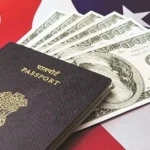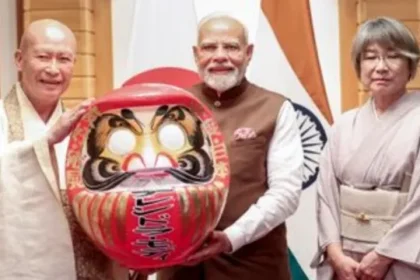‘Operation Clog The Toilet’: Online Hate Campaign Tried to Trap Indian H-1B Workers in India
A digital movement called “Operation Clog The Toilet” may become a bizarre almost comical footnote to the history books when they start reviewing the migration politics of the mid-2020s. The title was crude but the mind behind it was a concerted effort of the anonymous internet cyberwars to prevent any Indian holding an H-1B visa to foreign soil so they could not be back in the United States.
Introduced on the fringe message board 4chan, the movement occurred a few hours after the US President Donald Trump signed an executive order imposing a $100,000 fee on H-1B visas. This was an order that was in the format of a jobs-protection law, yet which immediately gave panic to Indian laborers- who represent the majority of H-1B holders-even triggering a rush back home before the new regulations took effect.
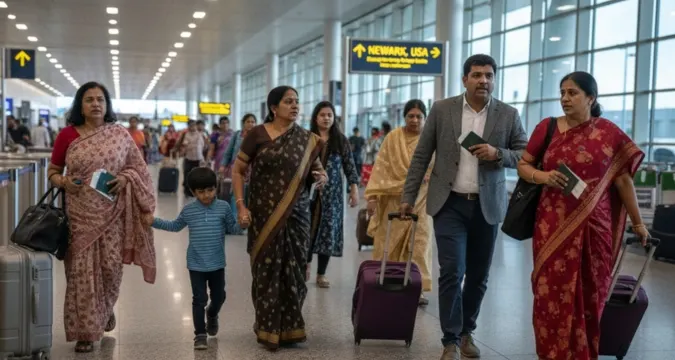
It started as a political game in Washington but soon turned into a surreal war with online trolls, airlines and thousands of Indian families. The trick proposes more about immigration fears, the instability of computer infrastructure, and the strength of Indian specialists trapped between two worlds.
The First to Feel the Shock Were Indians.
The H-1B program itself has always been skewed toward Indians. According to data of US Citizenship and Immigration Services (USCIS), it:
- In FY2022, 73% of H-1B approvals were of Indian nationals.
- Approximately 300, 000 Indians now serve on H-1B visas in the US.
- California, Texas, New Jersey and others accommodate the highest concentration of states, and Indian workers are centered on the Big Tech and financial sector.
And decades of the finest Indian engineers and coders and analysts have been bridging some of the most important gaps in the American labor pool. At companies Microsoft, Amazon, Google, Meta, and JPMorgan, they rely on whole groups of project workers.
The order issued by Trump was a thunderclap in this society. There was even a threat that families torn apart by continents might never see each other again, projects would be ruined, and even dreams carefully made over a long life could be stolen away in a single policy stroke.
That is why Indian tech workers scrambled to get tickets within a few hours of the announcement. Between September 18 and September 21, travel booking websites like MakeMyTrip, Cleartrip, and Yatra registered record traffic on India-US flights.
Airlines Caught in the Crossfire.
A normal one way ticket from New Delhi to the New York JFK costs between Rs 37,000-Rs 40,000 during the month of September. However, in the H-1B frenzy the prices soared:
- On September 19 2010 Skyscanner quoted economy seats on the non-stop Delhi-New York flight run by Air India Approx. Rs 78,500.
- Knowing the Delhi-Newark service of United Airlines made Rs 81,000 in economics.
- The only increase was more than Rs 70,000 by jumping flights like flights that change in Doha or Dubai.
Aviation theorists think that some of this rush was because it is naturally alive–but there was also a major deception by the so-called seat-blocking, the very ruse used by “Operation Clog The Toilet.”
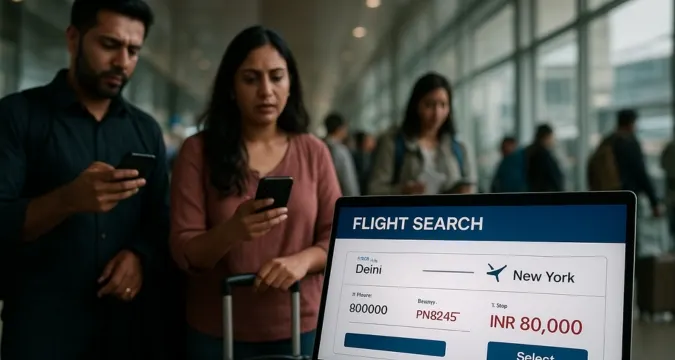
It is not illegal, it is disruptive as aviation expert Devesh Agarwal explains. When too many people hold unpaid tickets simultaneously it generates fake scarcity. The inventory of seats available at the airline is smaller, and algorithms automatically move the prices up.
Scalawags have employed this strategy in previous concert ticketing and in some sports events. The only thing new is using it as a weapon of xenophobic interference to international flights.
The Racist Undertones
The name of the campaign-Clog the Toilet was not accidental. It mirrors the old stereotypes that are thrown at South Asians on the internet.
Words like “Jeets,” “curries” or toilet cloggers are commonly used on forums like 4chan targeting Indians (referrals). Such terms demonize a whole community of people, and professionals of advanced degrees become crude caricatures.
The chilling language can be seen in the screenshots of the campaign:
- “Total Jeet death.”
- It takes whatever to make a turd-free West.
- “Store them in India, cripple the flight system!
This kind of rhetoric highlights the fact that immigration discussions are no longer merely a matter of policy–they are extremely racialized. Although Indian workers have become celebrated in Silicon Valley board rooms, they are derided in the subcultures of the internet pits, where they are viewed as outsiders to the Western identity.
Historical comparable: Not the First Target.
Indians are not the pioneer of online hate attacks in America.
- Earlier in the 2010s, the meme culture painted (or peppered) Mexican migrant workers as villains on the US southern frontier.
- In 2017, Chinese-Chat WeChat and Reddit organized a coordinated trolling operation against Chinese students, labeling them as cheating in school.
- When the Christians were in full swing, Asian Americans were the most common scapegoats on the Internet, and as a result, hate crimes started increasing too.
Using digital tools to target migrant populations during times of political strain by intimidation, restriction, or potential harassment is the same lineage into which Operation Clog The Toilet belongs.
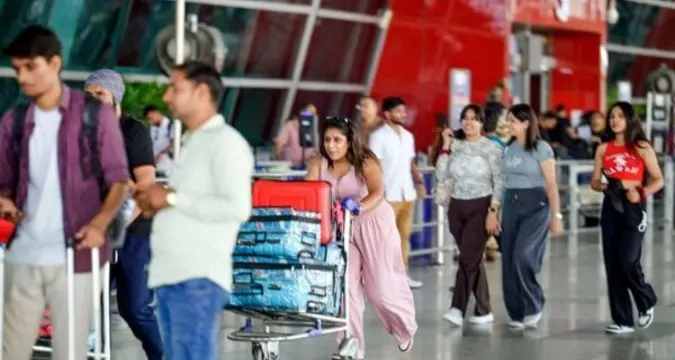
Beyond a Prank: A Cybersecurity Weak Spot
Although some wrote it off as a juvenile prank, the campaign casts profound cybersecurity concern.
Airline booking systems have been created in a way that is conducive to consumer behavior, rather than hostile coordinated attack defense mechanisms. By bookings repeated hundreds of thousands of times by a small number of users, or bots, they can produce a ripple effect:
- Algorithms governing price spikes.
- Less availability to the law-abiding consumers.
- A reputational loss to the airlines, who led sin tax actions.
According to cybersecurity researcher Rohan Malhotra, this was no hack, but is an indication of how thin the line between trolling and sabotage can be. Just consider how this would workout in case of mass evacuations or disaster relief flights. The effects would be disastrous.
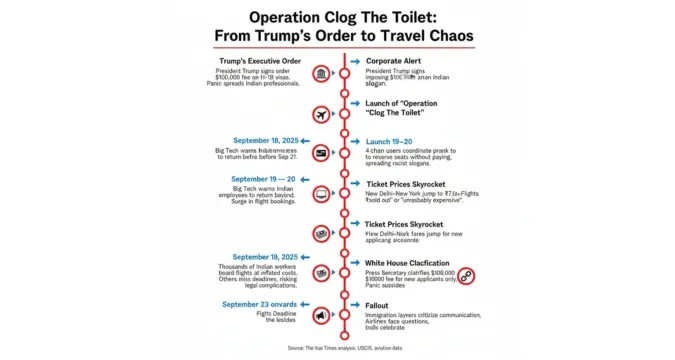
Several years ago, the International Air Transport Association (IATA) singled out ghost bookings as a menace. Airlines, however, have been slow to re-innovate reservation systems because of the perceived added strain to legitimate customers.
White House Walk-Back
In the confusion, the White House had to come out with clarification that the $100,000 fee would only be paid by new applicants, not those already holding the H-1B visa.
At this time, however, the damage was done. Workers had been charged exorbitant fees, families had passed a restless night, and trolls on the Internet felt that they won.
Immigration lawyers argue the confusion was avoidable. “Clear communication could have prevented panic,” says San Francisco-based attorney Priya Patel. “Instead, thousands of Indian professionals suffered financially and emotionally.”
The Bigger Immigration Process.
H-1B visas are limited to 85,000 new slots but above 400,000 applications are assigned yearly. The way to permanent residency is even more perilous among Indians. The green card backlog regarding Indians is more than 1.1 million people due to provisions in each country, with some citizens in 80+years waiting for the green card.
This is a structural imbalance that makes Indian workers exceptionally vulnerable. Any policy adjustment, any rumour trickles down to families, firms, even the economy of India, which enjoys the effect of home remittances.
What Immigrants Says
For many, the disruption wasn’t abstract—it was deeply personal.
-
Rohit Sinha, a software engineer from Hyderabad working at a New Jersey fintech firm, spent ₹1.6 lakh on two last-minute tickets for himself and his wife. “That was our rent and savings for three months gone in one shot,” he said.
-
Priya Nair, a data scientist with Amazon, missed her September 21 deadline because her flight was repeatedly “sold out.” She is now working with immigration lawyers to request an exemption. “It feels like I’m paying for political games I didn’t create,” she told us.
-
Aniket Mehta, who returned on time, says his American colleagues were shocked. “They don’t understand how much chaos one announcement can create in our lives. To them, it’s just news. To us, it’s survival.”
These stories reveal the human cost of mixing policy uncertainty with online hate campaigns.
The Implications of This on the Future.
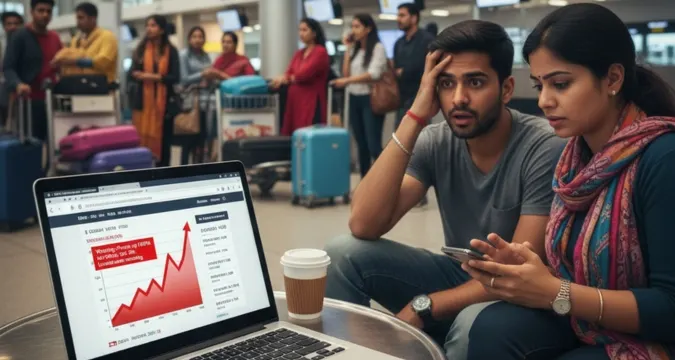
This episode leaves some burning questions:
For the US Government:
- What will the consequences of such policies as the $100,000 fee entail to the global competitiveness of America?
- Would talented Indians begin to have a second look at Canada, UK, or Australia which is aggressively marketing itself to these countries with a simplified visa process?
For Airlines:
- Is it possible to develop the booking systems to resist coordinated disruptions?
- Should there be the introduction of penalties to fight ghost booking?
For Indian Professionals:
- What can workers do in order to better protect themselves against policy shocks and digital harms?
- Will the incident result in increased lobbying by the diaspora groups in Washington?
The 2025 Immigration Climate represented by a Symbol.
Operation Clog The Toilet will probably drop off the headlines within weeks. But its meaning is what it represents:
- The vulnerability of immigrants lives in upheavals in politics.
- The digital hate and the mobility of real life.
- The contrast between the nation which depends on Indian talent and permits the existence of the online platforms where this very talent becomes demonized.
Now as Trump legally confronts his visa policies and airlines quietly reform their booking systems, a single fact remains evident to Indian H-1B workers and it is that they, in order to survive overseas, must bottle their necks not only to bureaucracy but even to the winds and whims of internet culture.




